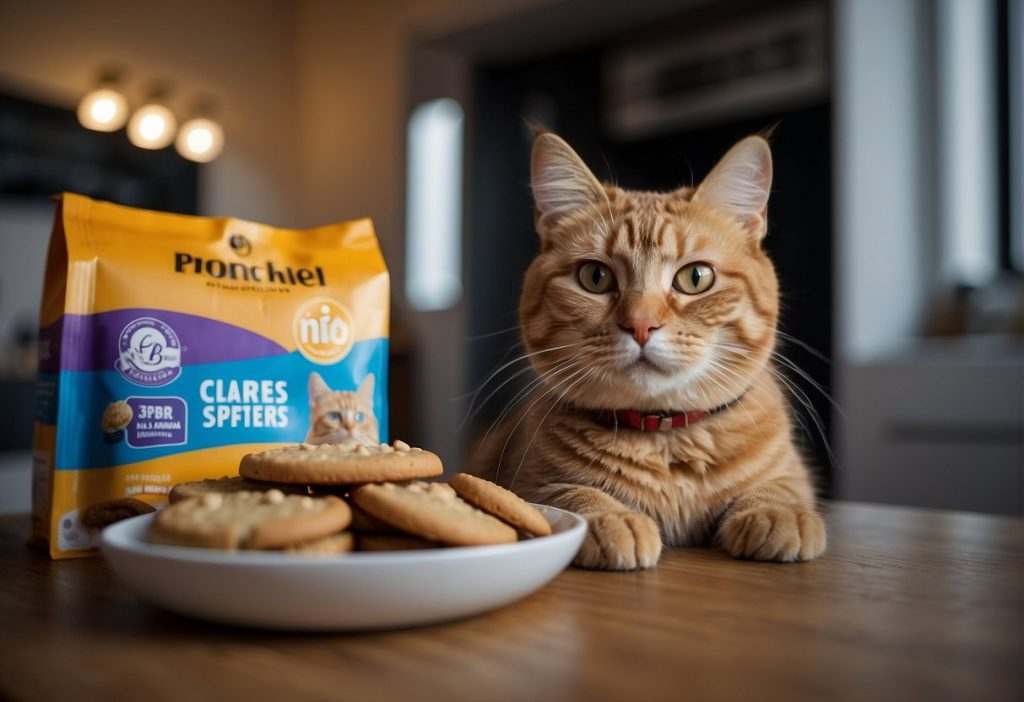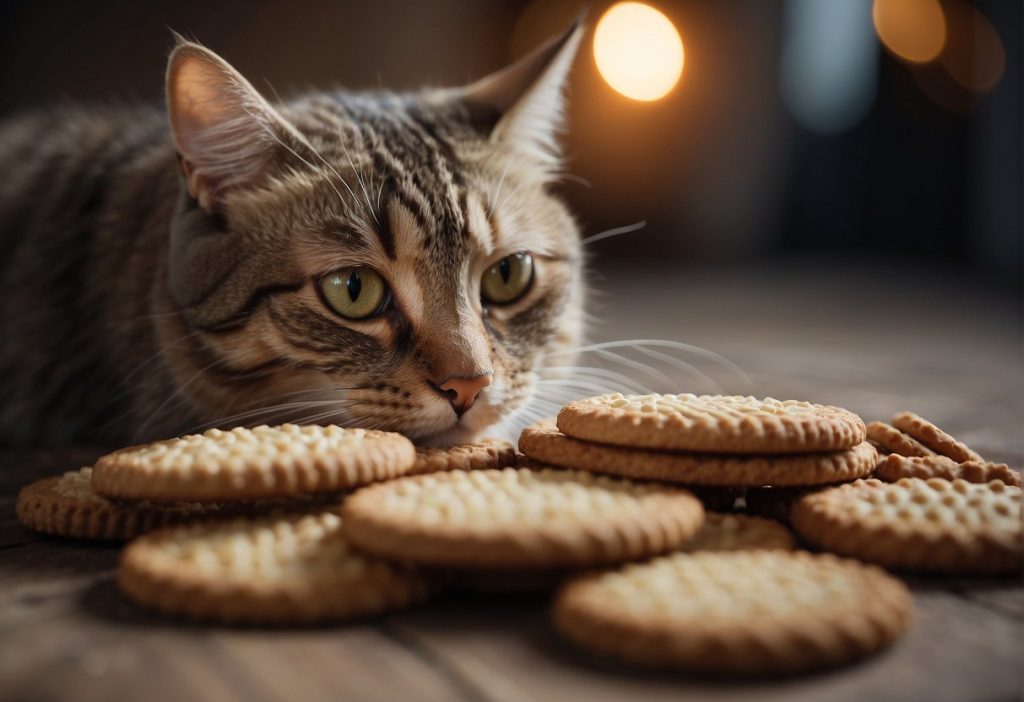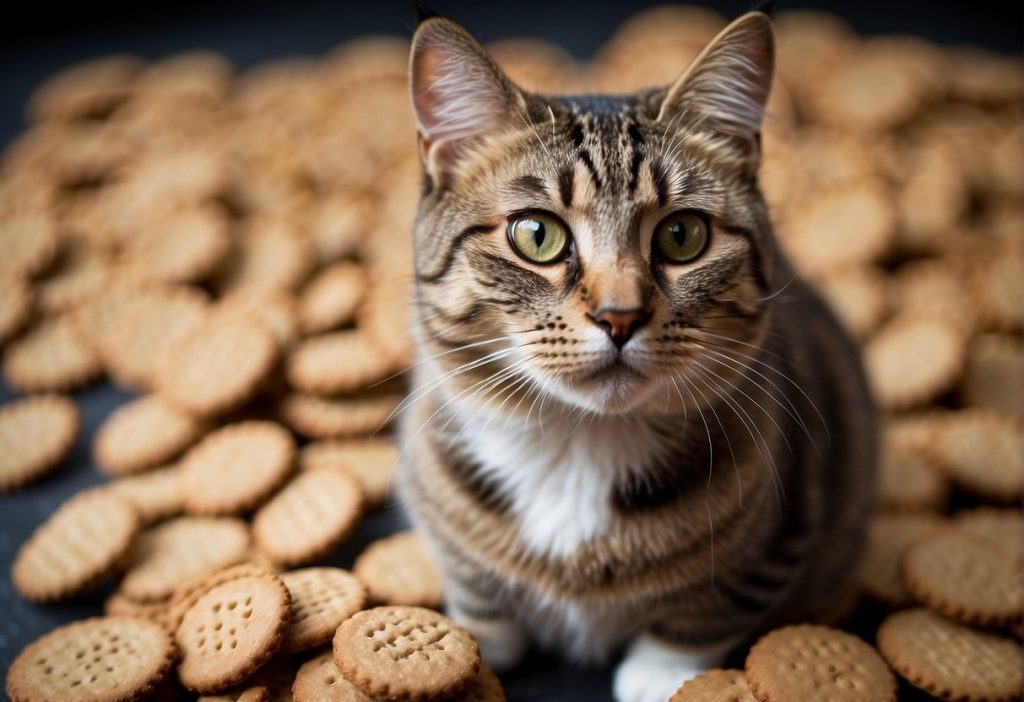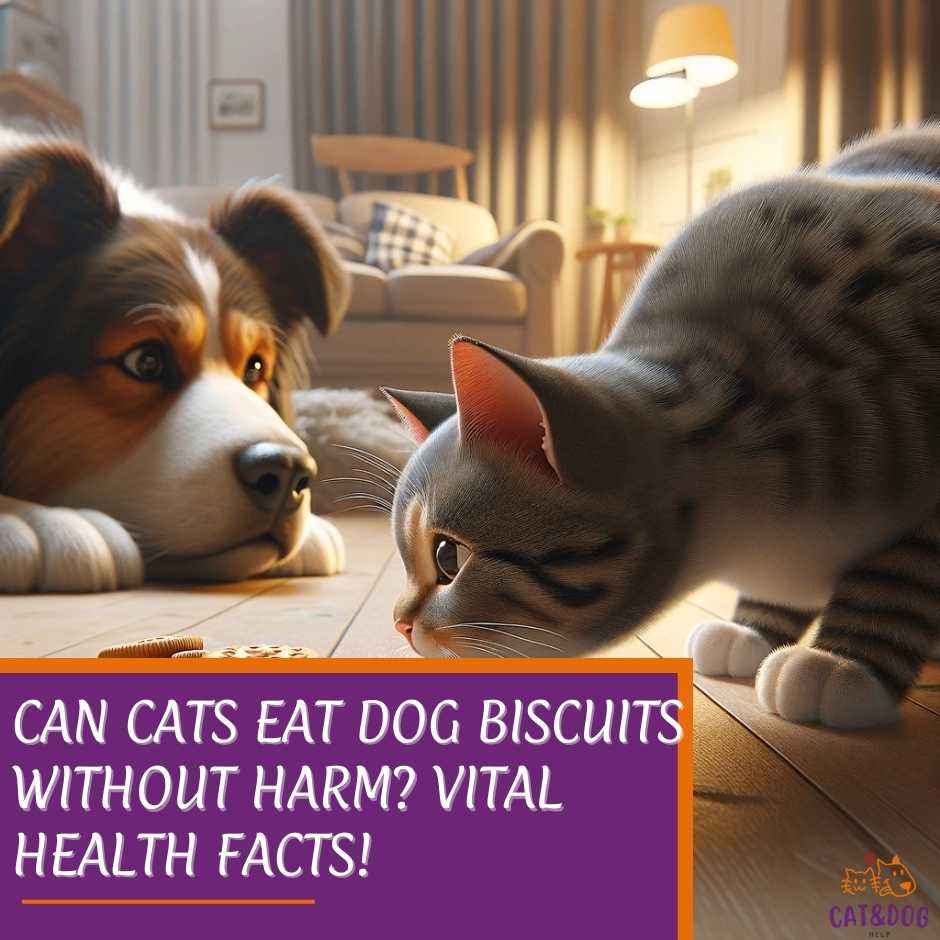Ever stumbled upon your cat nibbling on a dog biscuit and found yourself wondering if it’s okay?
You’re not alone. With cats and dogs often living together as part of the family, it’s not uncommon for their snacks to cross paths.
As a responsible pet owner, you’re right to question the nutritional impact of such cross-species snacking.
After all, dog food treats aren’t designed with a cat’s dietary needs in mind, as cats and dogs have very different nutritional requirements.
So, can cats eat dog biscuits?
The good news is that dog food treats aren’t toxic to cats.

Understanding what’s on your pet’s menu is crucial. Cats require a high-protein diet with certain amino acids like taurine, which are not typically the focus in the formulation of dog treats or food. (1)
So if you give your cat food that does not meet their protein needs, this will cause problems in their health.
So while the odd dog biscuit isn’t likely to pose an immediate danger to your kitty, regularly indulging your feline friend in dog treats could potentially lead to nutritional deficiencies, including digestion problems and not meeting a cat’s nutritional needs.
Here are some of the key differences between the two types of pet food.
Key Takeaways
- Dog treats are not formulated to meet the specific dietary needs of cats.
- Occasional consumption of dog biscuits by cats is unlikely to be harmful but shouldn’t become a habit.
- Consistent and balanced cat-specific nutrition is key for feline health.
Can Cats Eat Dog Biscuits?
You might be curious, why is Whiskers so finicky with food? Well, your feline friend comes from a long line of hunters.
Cats are true carnivores, and their survival in the wild largely depends on capturing prey. (2)
This natural behavior has deeply influenced their dietary needs—a diet rich in raw meat and protein is not just a preference; it’s a requirement.
What’s on a cat’s menu in the wild? Consider the following:
- High protein: From birds to mice, natural prey provides a protein-packed meal for cats. (3)
- Fats: Essential for energy and healthy skin and coat.
- Very little carbohydrates: Unlike their canine companions, cats have little need for carbs.
Now, what makes these nutrients so crucial? Here’s a quick rundown of some key dietary must-haves for your furball:
- Taurine: An essential amino acid important for vision, heart function, and reproduction. A lack of taurine can lead to serious health issues, including heart disease. (4)
- Arachidonic acid: A fatty acid that cats cannot produce on their own—vital for maintaining a healthy coat and proper organ function. (5)
- Vitamin A: Unlike dogs, cats can’t convert beta-carotene to Vitamin A and must obtain it directly from their diet. It supports healthy vision and immune function. (6)
If these essentials are missing from their diet, it’s just like a heart without a beat—trouble’s bound to happen.
Nutrient deficiencies in cats can cause a host of health problems, from dull coats and skin issues to more severe complications like vision problems or heart diseases. (7)
Emphasizing moderation in cat treat consumption, especially when considering dog biscuits, ensures your cat receives a balanced diet without risking nutrient imbalances.
So, next time you’re tempted to treat your cat with a little nibble from the dog’s bowl, remember: their bodies are designed for mouse-catching, not kibble-crunching!
Keep those whiskers wiggling with the right diet, and your kitty will thank you in purrs and head bumps.
Dog Biscuits vs. Cat Food
Ever wondered why your furry friends have different snacks? Let’s chew on the fact that dog biscuits and cat food are tailored to their specific dietary needs.
Differences in Nutritional Composition
First, let’s sink our teeth into the content. Dog biscuits often have less protein compared to cat food because dogs aren’t as dependent on protein as cats.
You probably know that cats are obligate carnivores, right? This means they need a diet rich in meat, like cat dog food, to thrive.
Now, check out this little nugget: cats require taurine, an amino acid that’s abundant in cat food but not always present in dog treats.
Taurine deficiency in cats can cause heart problems, digestive trouble, and even blindness. It’s important to remember that dogs, on the other hand, are omnivores, so their nutritional needs differ from those of cats. (8)
Here’s a breakdown:
| Nutrient | Dog Biscuits | Cat Food |
| Protein | Moderate | High |
| Taurine | Low to None | High |
| Essential Nutrients | Balanced for dogs | Balanced for cats |
Potential Health Implications
Giving Fluffy a dog biscuit might seem harmless, but over time, this could lead to nutrient imbalances. Imagine running a car on the wrong fuel; it’s not going to end well.
A cat not getting enough taurine can develop heart issues, like dilated cardiomyopathy, or vision problems. And that’s just the tip of the iceberg!
So, while the occasional stolen dog biscuit won’t spell disaster, it’s not a habit you want to encourage. Keep those cat treats handy, and let’s keep Sparky’s snacks for Sparky, shall we?
Feed your whiskered friends what they’re meant to eat, and they’ll thank you with purrs and headbutts galore.
Can Cats Safely Eat Dog Biscuits?
Hey there, curious cat owner! Ever caught your cat eyeing those dog biscuits with interest? It’s a common scenario, but can your whiskered pal safely munch on Fido’s treats?
Expert Opinions: Dr. Flufferson, DVM, says, “While an occasional nibble likely won’t harm them, cats have different nutritional needs than dogs.”
Cats require taurine, an essential amino acid found in meat, which dog biscuits might lack.
Real-world examples: There’s been chatter about kitties who’ve had digestive upsets after sneaking dog biscuits.
Cases include mild stomach aches to more severe nutrient deficiencies when dog biscuits replaced their regular meals.
Risks: While your cat might not turn into a cookie monster from a bite or two, here are some things to chew on:
- Digestive issues from ingredients not suitable for cats (e.g., garlic, onion extracts)
- Nutrient imbalances over time, as dog biscuits aren’t formulated for strict carnivores like cats
Benefits? Some argue that the crunch of a dog biscuit could benefit a cat’s dental health. But remember, the cons might outweigh the pros.
So, should you share those biscuits? Perhaps stick to cat-specific treats designed with your kitty’s needs in mind.
Keep those dog biscuits for the pooch and ensure your feline friend enjoys snacks that cater to their health. After all, happy pets make for happy homes!
Remember, consulting with your vet about your cat’s diet is always the best treat you can offer!
Tips for Safe Feeding

Occasional vs. Regular Feeding
Hey there, cat lovers! Ever wondered if you can toss a dog biscuit your cat’s way?
While it’s not exactly party food for your feline friend, an occasional dog biscuit won’t likely be the end of the world. But remember, the keyword here is occasional.
Think of it as a once-in-a-blue-moon kind of treat, not a daily snack of dog food.
- Guidelines for Frequency: Limit dog biscuits to once a week, at most.
- Portion Size: Keep it small – a tiny piece is enough to satisfy their curiosity.
Alternative Treat Options
What’s better than dog biscuits for your kitty?
Treats made for cats! There’s a smorgasbord of commercially available cat treats that are both nutritious and delicious. These treats are tailored to meet your cat’s dietary needs, so you can’t go wrong with them.
Here’s a tip: try giving your cat some homemade treats! Check out simple recipes that might include tuna, chicken, or salmon for that gourmet cat dining experience.
Here’s an idea to whet your whiskered friend’s appetite:
- 1 can of tuna
- 1 egg
- 1 cup of flour
Mix these up, roll out bite-sized pieces, and bake. Voilà! You’ve got a batch of kitty-approved snacks!
For pet owners seeking safer options, exploring a variety of treats cats can eat, specifically designed for their nutritional needs, can make snack time both enjoyable and beneficial for your feline friend.
Remember to treat treats like treats. They’re not a substitute for a balanced diet. Keep those goodies diverse and mindful of your cat’s health and always make sure fresh water is available. Happy treating!
Quick Recap

Hey there, you’re probably wondering if it’s okay to slip your furry feline a dog biscuit, right?
It’s a common question that pet parents have, and it’s great that you’re checking before sharing those dog treats with your kitty. Let’s break it down:
- Cat Dietary Needs: Cats are obligate carnivores. That means they require a diet high in meat to survive. Dog treats, on the other hand, can contain grains and other fillers that cats don’t need.
- Risks of Dog Biscuits: Some dog treats may contain garlic or garlic powder, which are toxic to cats, it is better to avoid any toxic ingredients to cat. Even a pinch can lead to anemia. Also, certain artificial preservatives like propylene glycol can harm your cat.
But, can they have dog biscuits? Maybe just a nibble?
- The consensus is that a sneaky bite probably won’t hurt most cats. However, it’s not recommended to make it a habit. Dog biscuits aren’t formulated for the specific nutritional needs of cats.
If they do sneak a treat:
- Monitor your cat: Keep an eye on them for any adverse reactions, especially if they have a sensitive stomach.
- Remember Allergies: Your cat might be allergic to ingredients found in dog treats, such as specific proteins.
In summary, while your cat eyeing those dog treats is understandable, it’s best to stick to treats made just for them.
Keep their snacks cat-friendly to ensure they receive the right nutrition and avoid any potential health issues, including weight loss.
Consider this a friendly nudge to spoil your cat with treats that are tailor-made for their carnivorous needs, such as soft treats.
Frequently Asked Questions

Curiosity piqued about whether your whiskered friend can munch on those dog biscuits. Let’s get right to the point and answer some common concerns.
Are All Dog Biscuits Harmful to Cats?
Not all dog biscuits are directly harmful to cats, but they might not meet your cat’s nutritional needs. Dog foods often lack certain proteins and amino acids essential for cats, like taurine and arachidonic acid.
Can Cats Safely Eat Hypoallergenic Dog Biscuits?
Hypoallergenic dog biscuits are designed to avoid causing allergic reactions in dogs, but they may still be unsuitable for cats due to different dietary requirements.
Are there any side effects for cats who snack on dog food now and then?
Occasional snacking on dog food can lead to an upset stomach in cats. Consistently eating dog food, however, could result in nutritional deficiencies or weight gain.
Are There Any Dog Biscuits Designed for Both Cats and Dogs?
Some treats are marketed for both cats and dogs, yet it’s crucial to ensure that they contain the vital nutrients cats need, which are not always present in dog treats.
Can Feeding Dog Biscuits to Cats Cause Allergies?
Yes, cats can develop allergies to certain ingredients in dog biscuits, just as they might with any other food not specifically formulated for them.
Can Feeding Dog Biscuits Improve My Cat’s Dental Health?
While some dog treats are made to improve dental health, they are not a substitute for feline dental care. Cat-specific treats are better suited for your cat’s oral health requirements.
What Are Some Signs My Cat May Be Suffering from Digestive Issues Due to Dog Biscuits?
Signs of digestive issues in your cat can include vomiting, diarrhea, decreased appetite, or lethargy. If you notice any of these symptoms, it’s best to consult your veterinarian.
- Free Online Casino Games: What You Need to Know - July 26, 2025
- Ideal Casinos Mobile: The Ultimate Guide to Mobile Betting - July 26, 2025
- The Ultimate Overview to Casino Site Gamings Online - July 26, 2025


